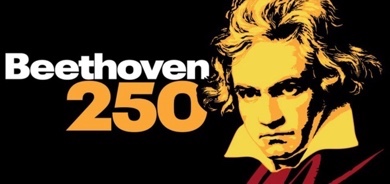We are calm in our souls. Beethoven's 250th birthday.
“Dear brother - The time of our death has come, but we are calm in our souls. We are now listening to the Eroica of Beethoven”
– Andreas Zakos, Greek Cypriot EOKA hero, last letter, 8th August 1956 *
In the event, the fifth child was born. The year, 1770.
His name is Ludwig van Beethoven.
His music would become the most performed in the world. He’s one of the most admired composers in all of music.
This year marks the 250th Anniversary of the composer’s birth. Perhaps, there is more to admire in Beethoven than there is to love.
Beethoven wrote some of the greatest ever musical masterpieces: the 7th and 8th symphonies, the 5th piano concerto, the Missa Solemnis, the late Sonatas and Quartets.
There is music by other composers that is deeper than Beethoven’s, more soothing, mysterious and miraculously healing, such as that by Monteverdi, Purcell, Mozart and Schubert. But none has been as politically inspiring as Beethoven’s.
Beethoven has two modes in his music: public and private. The public mode is his most forceful, shouty, desperately trying to be great, willing forward the course of music history, but also at his most histrionic, tub-thumpy and unsubtle, e.g. 5th symphony, 9th symphony, and 3rd Piano Concerto.
The private mode has emotions welling up inside him and overflowing onto the stave. They go direct from the heart to the heart, e.g. 2nd symphony and String Quartets 13 - 16. This mode reveals a softer, lyrical side. Best examples: D major Piano Sonata, op.28 (at his most Schubertian), and G major piano sonata op.31.
Sometimes the two modes coincide, when passionate emotion drives the public pronouncement with a force that’s movingly convincing e.g. the Eroica symphony and 5th Piano Concerto.
Beethoven’s works are often a combination of the two modes; a mish-mash and mix; going back and forth between the modes, e.g. Missa Solemnis, 4th Piano Concerto, the Hammerklavier Sonata.
There is no correlation between the modes and their quality. There are great private ones, great public ones.
Beethoven is most himself in quirky, jokey, abrasive music. The 2nd symphony, the Piano Sonata op.31 and the 8th symphony are the most Beethovenian works. He is himself, not trying to be anyone or anything else. Sardonic. Mocking. Quizzical. Surprising. Jolty. Jerky. Slapstick. Ironic. Lumpy.
The 8th symphony is far away from any other music. It could only have been written by Beethoven. It’s the hardest to perform. Of the hundreds of recordings, few conductors manage it: Nikolaus Harnoncourt, Roger Norrington, Otto Klemperer, George Szell, Sir Charles Mackerras.
You can hear the joins in Beethoven. His method of composition was like Stanley Kubrick’s in film – blocks of ideas welded or clamped together. A transparent example being the choral fantasy – the blends aren’t seamless but yoked together by violence.
Beethoven is a punk - loudness is the thrill. The visceral, sensational volume is essential to the effect. He wants to scare people out of their seats.
I raise my glass to Ludwig. The punk of classical music. Happy 250th Birthday.
James Neophytou
[* - Andreas Zakos was convicted by the British colonial court and hanged on 9th August, 1956. He is buried in the Imprisoned Heroes Tombs, Nicosia]
(Published in the Parikiaki newspaper, 20th August 2020)



Comments